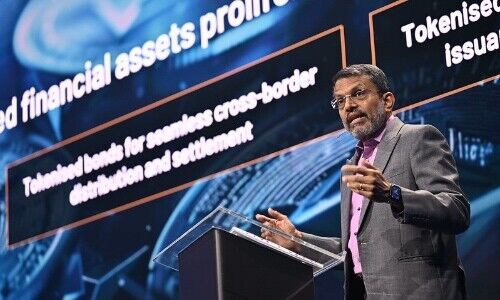Ravi Menon discusses the future of finance in a wide-ranging speech at the annual Point Zero Forum in Zurich.
The long-tenured former managing director of the Monetary Authority of Singapore (MAS), Ravi Menon, has always been clear and succinct in public when it comes to key regulation, fintech, and crypto topics.
That was particularly the case after the onset of the so-called crypto-winter a couple of years back that ended up taking out many industry luminaries including FTX CEO and founder Sam Bankman-Fried and Binance’s Changpeng Zhao. At the time, Menon had to keep a tight rein on matters given that the crisis also prompted several casualties in the city-state, among them the Three Arrows capital hedge fund.
Only for Speculation
Although he is the current ambassador for climate change and a senior advisor to the National Climate Change Secretariat of Singapore, Menon has kept his penchant for straight talk.
During the keynote address at the annual Point Zero forum in Zurich this week, for example, he said that «private» cryptocurrencies «have failed the test of money». «They have performed poorly as a medium of exchange or store of value beyond that for purposes of speculation,» Menon stated.
More Direct
If anything, he has gotten more direct given that in December, while still at the MAS, he made a similar statement, as finews.asia then reported - although he qualified it at the time by saying cryptocurrencies «failed the test of digital money».
But as then, he now continues to see much more promise in Central Bank Digital Currencies, or CBDCs are they are commonly known, tokenized bank liabilities and «well regulated» stablecoins.
Co-Existence Mandatory
Menon mentioned SWIFT tests of an interoperable connector linking the CBDCs of the Hong Kong Monetary Authority (HKMA), the National Bank of Kazakhstan, and the Reserve Bank of Australia with 30 financial institutions.
«The aim is to enable tokenized currencies to co-exist with fiat-based currencies and payment systems,» he maintained.
Unfit for Purpose
A big problem right now, however, is that digital asset networks are not fit for purpose and can’t serve as a global infrastructure for a tokenized financial system.
Most aren’t interoperable and reflect differing commercial rationales or legal and regulatory requirements. Public permissionless blockchains, for example, have attracted significant numbers of users and applications but they suffer from a dearth of accountability, anonymity, and legal uncertainty. Private permissioned ones adhere to legal and regulatory constraints but aren’t interoperable which causes liquidity in digital assets to fragment.
The Future Finternet
«To realize the vision of seamless financial transactions globally, we need open and interoperable digital asset networks that are compliant with regulatory requirements. We cannot force consolidation of all financial transactions onto a single network. It is more feasible to work towards making these diverse networks interoperable,» Menon maintained.
To address this, the Bank for International Settlements (BIS) has proposed the concept of a «Finternet» where multiple ecosystems are interconnected by way of unified ledgers.
Regulating AI
In Singapore, the MAS is already taking steps in that regard by partnering with BNY Mellon, Citi, SG Forge, JP Morgan, and MUFG on a so-called Global Layer One project which in effect is a public-good-digital infrastructure that allows cross-border transactions and the trading of tokenized assets.
But he also touched on other themes during his address, among them the regulation of AI. «We need regulation of AI; we need it fast and we need it harmonized» given its rapid spread and development.
EU in Front
According to him, the EU is in front of everyone else after passing a relevant act in March of this year, saying it represents « the first comprehensive regulation on AI by a regulator, anywhere».
The approach in the US seems to be more patchwork with a large number of bills regulating «small slices» of AI while China appears to be taking a more targeted and phased approach toward the matter.
Quantum Computing – the Next Big Thing
Singapore, for its part, has focused on providing guidance on how AI should be used responsibly while also setting out a governance testing framework that contains ethical and governance considerations, and principles related to transparency, explainability, fairness, well-being and safety.
He also believes quantum computing could be the next big thing for finance as well as other fields but that it also poses substantial risks.
Profound Security Risks
It can be used to compromise encryption protocols safeguarding data that could potentially undermine the integrity of financial infrastructure and, consequently, trust in finance itself.
It can severely impair inter-bank system interfaces and public key cryptography that payment systems need for authentication, which means that embracing it comprehensively will require a proactive approach.
Technology is Not the Whole Answer
Examples of that are Singapore and Japan’s collaboration on a connectivity blueprint that aims to standardize protocols that allow two parties to produce a shared random secret key. In the US, a 2022 act mandates that vulnerable federal IT be migrated to so-called «quantum-safe» equivalents.
«There are deeply impactful benefits to harness from these technologies. But that depends critically on how we manage the substantial risks associated with these technologies. The answer lies in us, not the technologies,» Menon concluded.




























